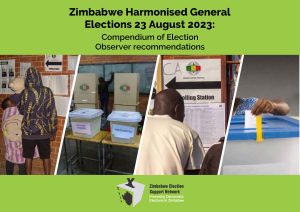On 18 December Nomination Courts in Marondera, Chinhoyi, Gweru and Bulawayo
convened to fulfil Zimbabwe’s legal procedure in officially verifying and accepting aspiring
candidates’ nomination papers ahead of the coming National Assembly by-elections
scheduled for 3 February 2024. By-elections will be conducted in accordance with
Statutory Instrument 235 of 2023, Proclamation 10 of 2023 to fill the parliamentary seats
left vacant by the recalls of six (6) incumbent legislators. Vacancies occurred following the
recalls of Citizens Coalition for Change (CCC) candidates on 10 November 2023 by the
party’s ‘interim secretary general’ who declared they had ceased to be members of the
party.
The recalls triggered the need for by-elections to choose new representatives in Mkoba
North, Goromonzi South, Seke, Pelandaba-Tshabalala, Zvimba East and Chegutu West
Constituencies. Among the recalled Members of Parliament is the CCC organising
secretary, Amos Chibaya, who is also Chief Whip of the party, and the party’s deputy
spokesperson Gift Ostallos Siziba, representing Mkoba North and Pelandaba-Tshabalala
respectively. Admore Chivero (Chegutu West), Tapfumaneyi Willard Madzimbamuto
(Seke), Oliver Mutasa (Zvimba East) and Stephen Chatiza (Goromonzi South) also ceased
to be members of Parliament for their respective constituencies on 10 November.
In line with its objectives, ZESN members observed the nomination processes at
designated Magistrates Courts. Due to resource constraints, ZESN members observed the
nomination process for parliamentary contenders only and excluded nomination sittings
for the twelve (12) Local Authority Councillors. To promote consistency across its
observation, ZESN agreed on a common framework and approach through which
members were guided in terms of gathering information on the process and outcome of
the nomination.
Download Full Report Here
